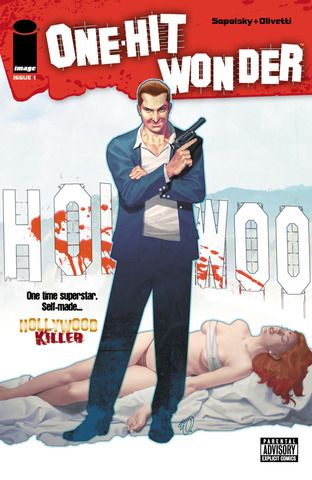Reviewing the pilot of any installment media is tricky -- consumers are often watching the creators figure out what works while on the job. On the other hand, what we as audience are given is the first impression, the most indelible of all, that will make us decide if there's enough meat on the skeleton to come back. While it's maybe the most beautiful book of the week, I can't say I'm excited about returning to Fabrice Sapolsky and Ariel Olivetti's "One Hit Wonder" after this first issue.
The concept for this book is great: a former child star takes up the job of professional assassin, trying to make his IRL kills as cinematic as they are in the media. Using the connections he has with the industry, he finds targets and uses special effects to make himself seem like a greater threat than he actually is. This is a scenario that is rife with potential, especially in a city notorious for Scuzzy People In Shiny Clothes. (Side note, I think I just discovered the title of my memoirs.)
Ariel Olivetti's art is gorgeous. That painterly style suits the action really well. The shots are all composed well, page layouts are fun and create a great flow. The characters all remain on model and are easily distinguishable. This book has the most realistically rendered set of exposed breasts I've seen outside of a Vertigo comic. It's the type of work Olivetti was born to draw - all of it not just the breasts, come on gutter brain. The Wolfpack has a set of fonts in the book that are fun and well-designed and the logo for the book is fantastic.
But then there's this script.
This one's a clunker, sports fans, and I'm really sad to say that. The dialogue is not believable, and the plot itself is choppy. There are lines that are supposed to be catchphrase moments but just fall flat -- "Who's your daddy?" is a great example. Richie might as well have shot someone while yelling "WASSSSSSSSUP?"
Our protagonist is a douche, which I can accept as such, but he's not entertaining, sympathetic or even slightly charming. He's just a capital Dick. In fact, no one in this book is likable -- which can be fine! (My favorite show on TV is "It's Always Sunny In Philadelphia," a show full of unlikable jerks.) However, having an unlikable character means there is even greater onus on the writer to deliver razor sharp dialogue that makes the audience want to come back. A jerk in a story has to be really good at being a jerk, and none of the people in this story are very good at being jerks.
This is a story surrounding storytelling culture. If you're going to satirize a thing with violence then you need to deliver in a manner that is as superior as your viewpoint. "One Hit Wonder" does not do that. Instead, there are lines like, "I killed [a shrink] this week. Just hate them. You want me to start hating accountants too? Leave. NOW." Several tin-ear lines like this in the story manage to pull it down to a level where it becomes distracting to the story. The plotting is odd too; at one point we cut from Richie Reese and his target Molly Hines driving safely in an SUV to a group of kids Bling Ringing a celebrities house. After two pages of setup the SUV flies over the back wall of the house and into the pool. After Molly drags Richie out of the SUV she says he's going to pay for his crimes and then the story stops. It doesn't really end, it just stops.
There's something to this story, for sure, and it could go someplace great, but there are a lot of issues with the plot and script that will have to be addressed for it to pick up. This was originally published in French so all of this may be an issue of poor translation, and I very much hope that is the case. Sadly, "One Hit Wonder" is pretty but it doesn't have much to say.

